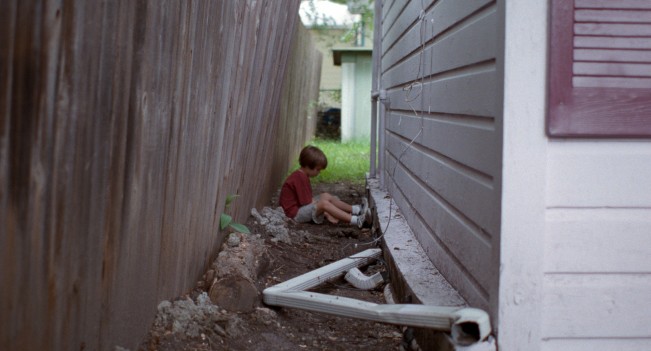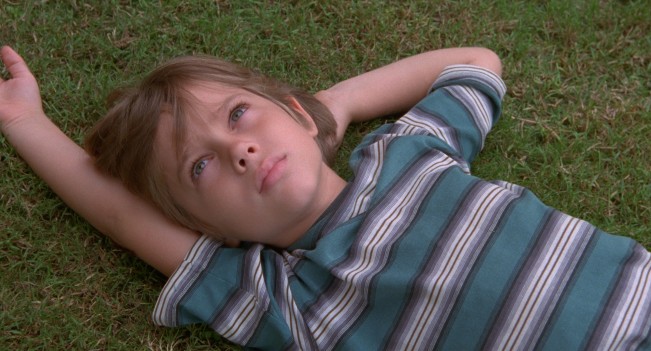By Jake Howell jake.howell@utoronto.ca
Sundance 2014 Review: Boyhood
 A little after 1 AM on Monday, January 20, 2014, in a 1,296-seat high school auditorium in Park City, Utah, a piece of cinema history was made: the lights came up on the world premiere of Richard Linklater’s Boyhood, a film in production for more than a decade.
A little after 1 AM on Monday, January 20, 2014, in a 1,296-seat high school auditorium in Park City, Utah, a piece of cinema history was made: the lights came up on the world premiere of Richard Linklater’s Boyhood, a film in production for more than a decade.
Boyhood is, undeniably, a landmark achievement in cinema. Shot on 35mm film on 39 separate days over a 12-year span, the film captures the real-life maturation of child actor Ellar Coltrane as he portrays Mason, a boy we watch grow into a fully-developed adult through the course of an astonishing 161 minutes. Coltrane is 19 now; he was six when filming began. I’ve seen a lot of movies, but I’ve never seen anything like this.
We become uniquely attached to Mason and his family through their visible aging and relative milestones. Year in and year out, the wrinkles and cycles of domestic drama are believable, relatable, and perfectly acted. Of course, this is to be expected after Linklater’s Before series, which more than showcased the director’s ability to remain centered on a saga with restraint and focus. There is not a false performance to mention (praise be to Coltrane for carrying such a picture), save for a single scene involving some underage drinking on a weekend trip with friends. It’s the lone example of lesser dialogue, but even then, it still holds moments of truth.
With Boyhood, Linklater ran the risky possibility of constructing a film based on a gimmick; as if chronicling something of this magnitude was the end, not the means. In other words, if the finished product had been trite or maudlin, we would be praising Boyhood as an accomplishment in its experimentation, not as a story. I am overjoyed to report that the leap of faith from everyone involved paid off: the narrative is served by this production “gimmick” in a way that other films simply are unable to, and it’s overwhelming.
From the outset, it’s immediately clear that Mason and his older sister Samantha (Lorelei Linklater) don’t have it easy. Their underemployed mother (Patricia Arquette) has a history of dating men that she is too good for; these suitors have either an unhealthy problem with alcohol or simply difficulty maintaining a regular job and schedule. Inevitably, through the course of Mason and Samantha’s life at home, a number of moves and divorces fragment their family unit, though their biological father Mason Sr. (Ethan Hawke) remains in the picture (albeit on the sidelines).
It’s on these weekend visits—camping trips, bowling excursions, etcetera—where we see Mason Sr. and Mason Jr. develop their father/son relationship. Outside of these paternal cameos from his senior, however, Mason Jr.’s various stepfathers at home never seem to click with him, so he’s forced to do a lot of learning on his own. It’s in this learning, this living, that the film becomes something that is so true to life. Watching it summons a tidal wave of personal memories, and as I had the distinct privilege of watching Boyhood alongside my father, there were several times throughout the screening where we shared laughs and knowing nods as the film struck a chord. Whatever role you play in your current family dynamic, there is much to relate to here; oftentimes it feels like Linklater cribs directly from your life itself.
“Life Itself.” Funnily enough, that’s the name of another film here at Sundance (a documentary on the life and times of the inimitable critic Roger Ebert) but it’s a title that feels wholly appropriate here. Let it register for a second that before our eyes, Mason—and Ellar Coltrane—transforms from a precocious child into a brooding adolescent until finally a handsome high school graduate. The transitions from year to year to year are seamless, and there is immense pleasure in trying to situate yourself in the innate passing of time through haircuts, top 40 songs on the radio, technological innovations, and major cultural issues. Linklater lets you piece together on your own the timeline of the last 12 years, and it’s awesome to reminisce where you were during certain touchstones. Did you attend a midnight “Harry Potter” release? Did you argue about the possibility of a seventh Star Wars movie? Otherwise, it’s with fondness and sadness and nostalgia that we revisit certain points of our lives vicariously through Mason and his family.
This film is a cinematic time capsule, and Linklater has again proven he is one of the greatest American filmmakers working today. I want to say it is a miracle that this movie is as superb as it is, given how many years it took (just think of the institutional memory required to come back to this project year after year). But calling it as such, I think, undermines Linklater’s masterpiece. This is not luck. This is something organic and powerful and unstoppably beautiful, sculpted meticulously by an artisanal storyteller’s vision and utterly sublime direction.

















Wow, I really want to see this.
Your excellent review really made me want to see this movie.
Based on your articulate review I now want to see this film! Thanks.